My 14 Favorite Free SEO Tools
I’ve said it before, but I love me a good free tool. Below is a list of my fifteen favorite freebies for doing SEO. While there’s a ton of tools out there, this article means to highlight the essentials. It’s nice to have a huge arsenal, but it can be more powerful to wield a few powerful weapons expertly.
14. GTmetrix
Having a tool to examine page speed and diagnose opportunities for improvement is now an essential part of the SEO toolkit. This is because anything that impacts user experience impacts SEO, and site speed is a big deal for UX. Many page-speed tools exist; I’ve found GTmetrix reliable and a good balance between thorough and user-friendly.
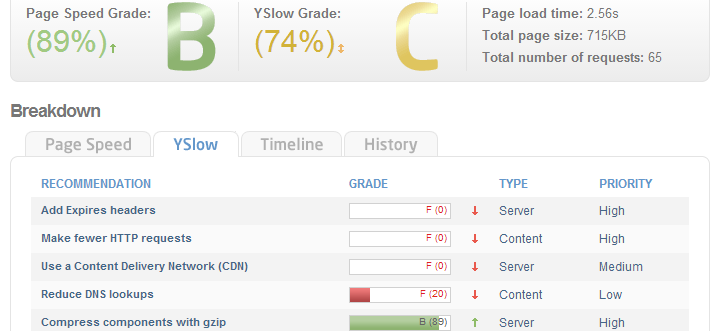
13. Wayback Machine
The Wayback Machine is the Internet’s most complete historical archive, and lets you see what a website used to look like back in the day. I can’t tell you how many times I’ve used it for detective work to crack client cases of missing traffic. If the numbers for a site have changed and something about that site has changed but you don’t have a site backup available – the Wayback Machine has your back.
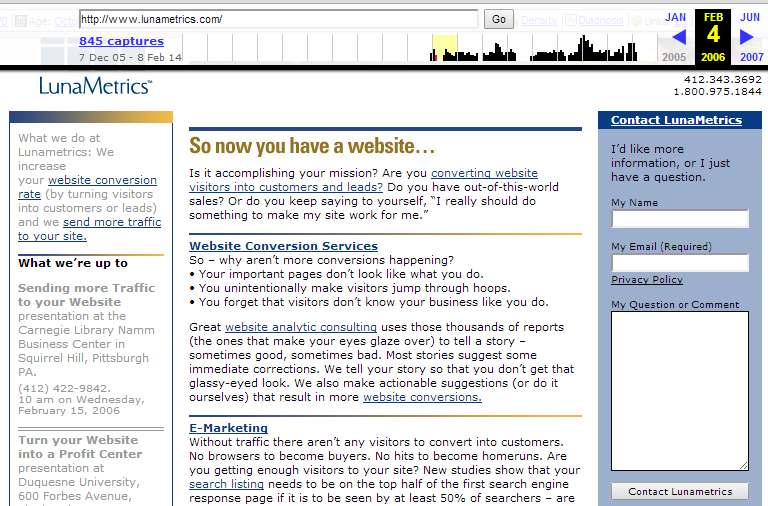
Plus, it’s just fun to see how much better your site looks since the Geocities days.
12. Xenu Link Sleuth
Don’t be fooled by the unassuming website. Xenu is a pretty powerful website crawler that crawls all the links on your site and reports on URL metrics like HTTP status code, content type, page size, and more. And it’s really good at finding broken links. I actually no longer use it because we use a paid crawler, but Xenu is probably your best bet for a hassle-free, dollar-free crawl of a site that has more than a few hundred URLs.
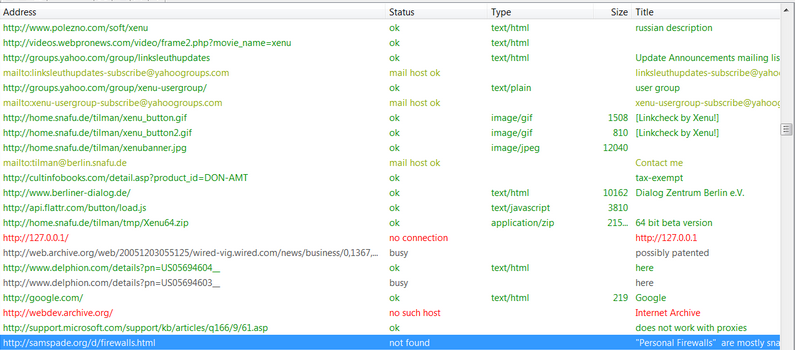
11. Web Developer Toolbar

The Web Developer Toolbar has become much relied-upon during the technical phase of our audits. Below are 3 articles explaining how to use all the goodies:
- moz.com/blog/web-developer-toolbar-for-seo
- searchenginewatch.com/article/2230045/SEO-Audits-the-Web-Developer-Plugin-12-Helpful-Features-for-the-Technical-SEO
- www.seoinhouse.com/resources/web-developer-toolbar-videos/
10. Majestic SEO
Majestic SEO’s flagship product is a powerful link analysis tool that crawls the entire web, logs billions of backlinks, and makes the link data available to you. You can get full access to any site you can verify control of (via Meta tag or Google Webmaster Tools ownership verification), enabling you to see every link to your site Majestic knows about ( a lot).
It’s by far the #1 free tool to examine your link profile, and I prefer it overpaid tools for some tasks due to its freshness and size of the database. Even for competitor sites, you can’t verify, it offers some useful data.
9. SEO Book SEO Toolbar

This browser toolbar puts a bunch of information about the page you’re viewing right at your fingertips. This includes:
- link data from Majestic SEO, Moz, Ahrefs, and more.
- traffic data from Compete, SEM Rush, Alexa, and more.
- on-page keyword optimization data including usage of keywords, header tags and more.
My only issue is that this is a Firefox-only toolbar.
8. SEO Quake

SEO Quake is a bit similar to the SEO Book Toolbar, and while not very pretty, is available on multiple browsers, including Chrome. SEO Quake shows data on traffic, links, social shares, on-page keyword optimization, and more. The SEO Quake website has lots of helpful tips on what to do with all this data.
7. Google Trends
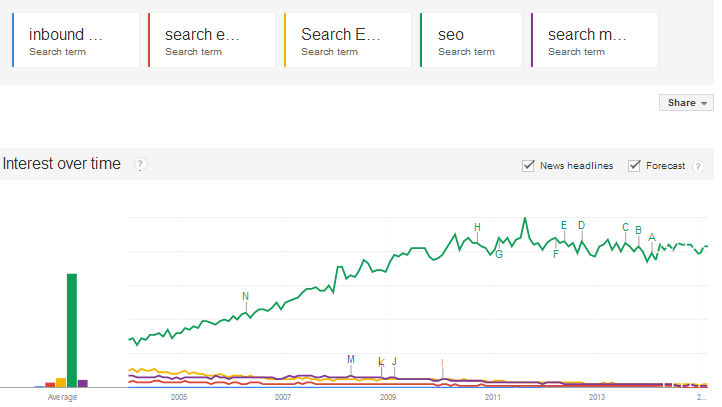
Marketers who know where the puck is heading tend to win more. Google Trends shows changes in search query volume for specific queries. They also have trend data on topics now in beta.
For marketers, especially in volatile industries like technology and fashion, it’s critical to at least keep up with the market. And, if you can master online trends analysis and get a step ahead of the competition, the results can be quite profitable indeed. For search marketers, it makes good sense to analyze changes in search query behavior. Even everyday writers can knock an article out of the park if they cover a soon-to-be high-interest topic before everyone else gets to it.
Bottom line: while often overlooked, Trends is an extremely powerful tool in the right hands. Below are some resources with Trends tips:
- inklingmedia.net/2013/04/01/6-ways-to-use-google-trends-for-your-business/
- contentmarketinginstitute.com/2013/08/use-google-trends-punch-up-content-creation/
- searchenginewatch.com/article/2292198/How-to-Use-Google-Trends-for-SEO
6. Screaming Frog
Screaming Frog is a website crawler designed specifically for SEO. Within mere minutes, you’ll get critical data on every URL. Best to just download it and take it for a spin. Once you see all that data, you’ll have questions, but they have a good user guide. The free version has most of the functionality but only can crawl 500 URLs at a time.
5. Google Keyword Planner
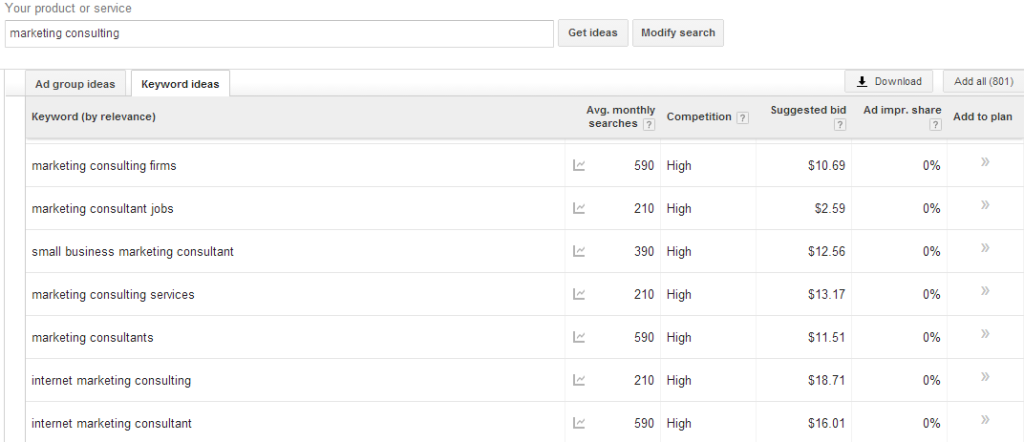
The tool is formerly known as Adwords Keyword Tool, Google’s Keyword Planner still lets you pull monthly Google search query volume estimates for dozens of keywords in seconds. I can never understate the importance of knowing what people search for.
4. Bing Webmaster Tools
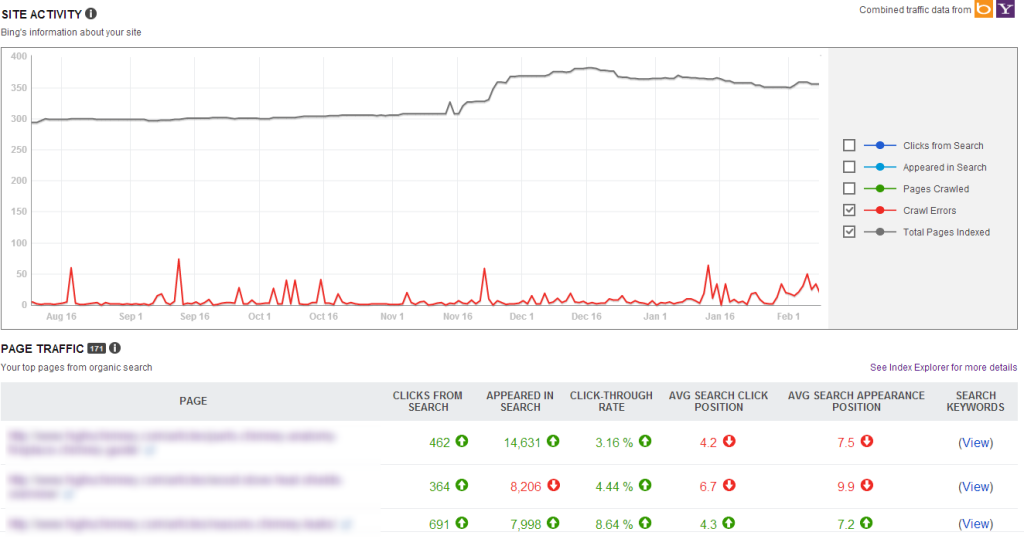
Bing Webmaster Tools (aka BWT) remains extremely overlooked. It’s great for keeping an eye on how Bing (which powers Yahoo) is treating your site and also enables you to have some control in the matter. But it offers benefits beyond Bing, like insight into crawling, indexation, on-page keyword optimization, and other elements that can impact your performance in Google. I wrote an article on some ways (like the nifty Keyword Research Tool) to use BWT a while back. BWT also has a great help section.
3. Moz

Moz is a suite of user-friendly inbound marketing tools. Below are my favorite free Moz tools:
- Open Site Explorer is a link crawler like Majestic SEO known for very helpful metrics approximating link equity.
- Followerwonk shows data on Twitter.
- GetListed lets you see the state of a company’s local citations and is to go-to for starting a local SEO campaign.
- Mozbar is a browser toolbar that lets you quickly get at Moz’s key features for the page you’re on.
- The SERP Overlay (seen on the right) shows OSE metrics on individual search results.
2. Google Webmaster Tools

Like BWT, GWT helps you keep monitor and configure how Google is treating your site. That’s a pretty big deal. I wrote a bit on GWT before. Simon Hesltine wrote an excellent article on getting started with GWT and using some of the most important features. More articles on GWT Tips are below:
- www.searchenginejournal.com/guide-5-ways-use-google-webmaster-tools-maximize-seo-campaign/88457/
- www.toprankblog.com/2009/04/6-tips-for-google-webmaster-tools/
- searchengineland.com/6-ways-google-webmaster-tools-can-improve-your-seo-strategy-175876
1. Google Analytics
If you’re reading this blog, chances are you’ve used Google Analytics. I think we may have written about it once or twice.
For me, the most valuable SEO data is that which helps you understand your visitors and how they interact with your site. No tool I’ve used – paid or free – delivers that data like Google Analytics, and none of the tools I mentioned does a better job on the data closest to the metric that matters most – the bottom line.
Thus, GA is the tool I depend on the most.
Honorable Mentions

Looks like I can’t count; here are a few more free cool tools I use:
- BuiltWith is a lightweight, user-friendly Chrome plugin that will tell what technology a site uses (like cms, server, hosting, analytics, and more).
- Firebug is a Firefox extension for web dev and technical SEO to help you inspect elements of code, code mockups live into the browser, and more.
- Google PageSpeed Insights, Pingdom, and WebPagetest are all decent alternatives to GTmetrix that diagnose page speed.
- UberSuggest lets you enter in a keyword and then quickly spits out a ton of great long-tail keywords.
- Google SERP Snippet Optimization Tool is a simple tool I use often to see what my Meta descriptions and title tags would look like in the SERPs (i.e. if they would get truncated).
- Hootsuite is one of many platforms for managing and scheduling social media posts. Such a platform is essential for social media management.
- CopyScape lets you enter a URL and learn if there is duplicate content elsewhere on the web.
- SEMrush shows data on paid and organic traffic and keywords. Accessible through the SEObook and SEOQuake Toolbars.
- SpyFu, like SEMrush shows some data on paid and organic keywords and traffic.
These aren’t “SEO” per se, but I love them so:
- Jing is my go-to screen capture tool and is what I used for the screenshots in this post and every post.
- Notepad++ is a lightweight text editor on steroids and a two-time winner of the SourceForge Community Choice Award for Best Developer Tool.
- Boomerang for Gmail helps me with e-mail management, reminders, client follow-ups, and scheduling outreach emails.
- Dropbox helps store and backup all the gigabytes I make and makes them easy to share.
- Excel is every search marketer's friend. Wicked Excel skills are a search marketing superpower.
Moarrr????
No Mas. I’m tapping out. But below you’ll find links to wild amounts of more free tools:
- moz.com/blog/100-free-seo-tools – Cyrus Shepard’s super user-friendly top 100 list.
- docs.google.com/spreadsheet/ccc?key=0AlgVNSddFpwxdE9rbUZzVEVock5tODFOVWVqellWaWc#gid=0 – Anne Cushing’s insanely meticulous Google Docs Workbook of tools covering over 300 SEO tasks.
- www.designjunction.com.au/useful-tools – a user-friendly, categorized list of over 500 tools, mostly web development with some SEO.
- www.blurbpoint.com/blog/best-seo-plugins-by-101-experts/ – 101 SEO experts weigh in on their favorite browser plugins.
- https://www.bounteous.com/insights/2014/02/05/essential-wordpress-seo-plugins-part-1/ – essential WordPress plugins by our very own Michael Bartholow.
- www.inbound.org/?query=tool – where the new tools pop up.


